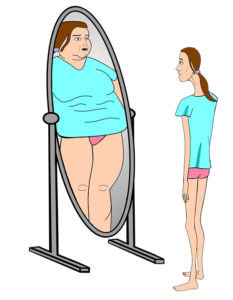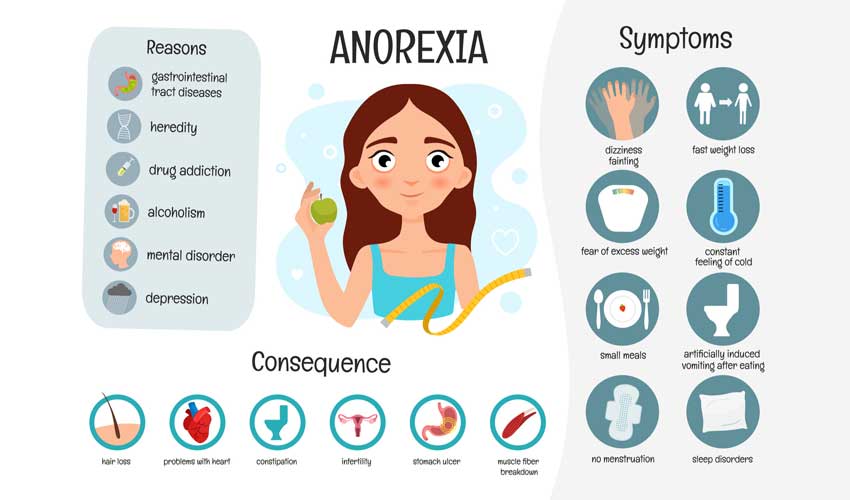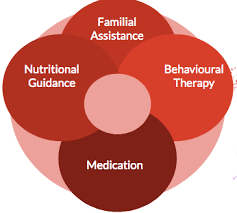Anorexia nervosa is an eating disorder. People with this problem think they are too fat when they are not fat at all. Many people who have this disease worry that if they get fat, they will stay fat forever. Sufferers may also be obsessed with food and how many calories it has. They might even refuse to eat at all. This article talks about anorexia and how to deal with it. The signs and symptoms are discussed, as well as treatment options.
What is Anorexia Nervosa?

Anorexia is a disease that involves excessive dieting. People who have this condition believe they are overweight when they are not at all fat. Many people who suffer from this condition are afraid of gaining weight and becoming obese for the rest of their lives. Food and calories might be a fixation for those suffering from anorexia nervosa. They may also refuse to eat.
What are the symptoms of anorexia?

There are many signs that you might have this disease. These include:
- being thin
- having a low body weight for your age
- they might also refrain from eating food
- people often think they are fat or gaining weight when they are not
- people with anorexia might also act like they love food or hate it to avoid eating anything at all.
Other symptoms include having trouble concentrating, feeling cold easily, and losing their period for three months in a row if they are female.
How Does Anorexia Develop?
Anorexia was usually developed at a young age. For many who have it, this disease had its roots in the teenage years. Often the cause of anorexia is unknown or there are multiple causes that combine to form this problem. Reasons, why people develop anorexia, might include things like:
- pressure from family members and friends
- social media pictures of skinny models
- anxiety about schoolwork, relationships, etc…
Even if these reasons are not enough for someone with anorexia to get help, they can provide hope for others who have the same problems. This article discusses how people who suffer from Anorexia try to hide their disorder because they think others will judge them if they know. People who have this condition often refuse to get help.
What causes Anorexia nervosa?
There are several factors that contribute to this disorder. These include:
- pressure from the media
- cultural values about being thin and beautiful affect those who have anorexia nervosa as well
- family problems or a bad relationship with your parents can also cause this disease.
How Anorexia Affects Your Health and Well-Being?

Anorexia is a condition that affects your health and well-being. This article discusses the effects of anorexia as follows:
- reduces oxygen supply to all organs
- slows down the heart rate
- causes low blood pressure which could lead to dizziness, fainting, etc…
- Putting on weight can cause bone loss. People who have put on weight might find that they feel pain from simple things like turning over in bed or breathing deeply.
- People with this disease might also suffer from constipation because they don’t eat enough foods that have fiber, like fruit and vegetables. Their digestive system slows down, and this can cause them to be malnourished.
- irregular or no menstrual periods
- loss of body hair on the arms, legs, and face
- dry skin that bruises easily because there is a lack of healthy fats in their diet too which causes poor circulation as well.
- people with anorexia also have problems concentrating, feeling cold very often, etc. In severe cases, it can lead to organ failure if not treated properly immediately!
There are several reasons why people develop this disease including wanting to lose weight quickly by severely restricting what they eat every day. This might be due to emotional issues such as depression or anxiety disorders but they could also want a quick way to become popular at school for instance without thinking about how dangerous those behaviors really are.
Where to Get Help for Anorexia and What to Expect?
There are several places where you can go for help. These include:
- Groups that offer support to those who have eating disorders or obesity problems
- Counseling from a professional therapist, psychologist, psychiatrist, etc. If you have anorexia nervosa, it may not get better without treatment. Sometimes people go to a counselor in person or they work with someone over the phone.
- Family therapy is important for people who have this disease. People with it usually see their bodies differently than other people do. The treatment helps them heal emotionally and get better at the same time. The family can share what they are seeing that triggers concern about anorexia nervosa so no one gets left behind during the recovery process.
- Sometimes people need to go to a hospital for medical treatment. This is best when they have a severe illness and need the help of professionals who are not in their home or family.
Prognosis
People with anorexia nervosa need to fully recover before they can return to normal life. They might not be able to think clearly, have memory problems, or feel bad all the time either for example. Some people need help from professionals. The professionals can tell them how long it will take and if they can recover at all on some days.
Anorexia is a condition that most people don’t know about and they may not talk about it. There are different types of treatment for this disease which include: family therapy, hospitalization, medications such as antidepressants or mood stabilizers when necessary to help with the emotional issues involved in anorexia nervosa. It’s important to take care of yourself. Eat healthy foods and exercise, too. Not all cases lead to organ failure but you should never ignore its signs and symptoms no matter how minor they might seem because there has been some research on deaths related to malnutrition due to lack of food supplies during wars so it is always better safe than sorry.
What treatment options do people have for Anorexia?

There are several treatment options. These include:
- Individual Therapy: This therapy helps people with anorexia to discover why they have this disease. The therapist helps you to understand your thoughts and emotions.
- Group Therapy: You will meet with other people who have problems similar to yours, such as anorexia or bulimia nervosa. You can share your struggles together and gain support from one another. This is a good option for those who suffer from this condition because they feel it’s embarrassing or shameful about their disease.
- Family Therapy: Your family meets with a professional too so that everyone involved in the treatment of an eating disorder has a say about what should happen next if someone needs help from professionals outside the family circle.
- Hospitalization: If necessary, hospitalization may be needed when severe cases require more intense care than outpatient therapy provide ver from anorexia nervosa.
Conclusion
Anorexia is a devastating disorder characterized by abnormally low body weight, distorted self-image, and fear of gaining weight. A person with anorexia will go to extreme lengths to avoid eating food or gain the smallest amount of calories possible. It’s important that you know that the condition can be deadly if not treated promptly! If your child has symptoms that are similar, please contact their doctor immediately for help before it’s too late.
If you are looking for affordable Online Counseling MantraCare can help: Book a trial therapy session


